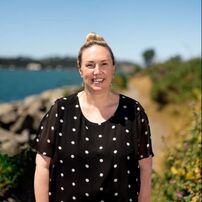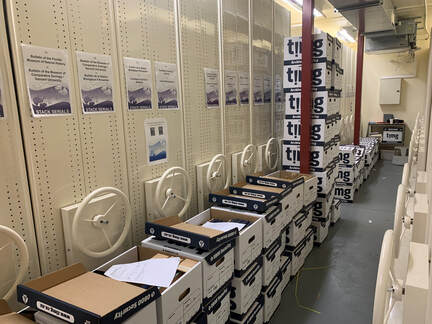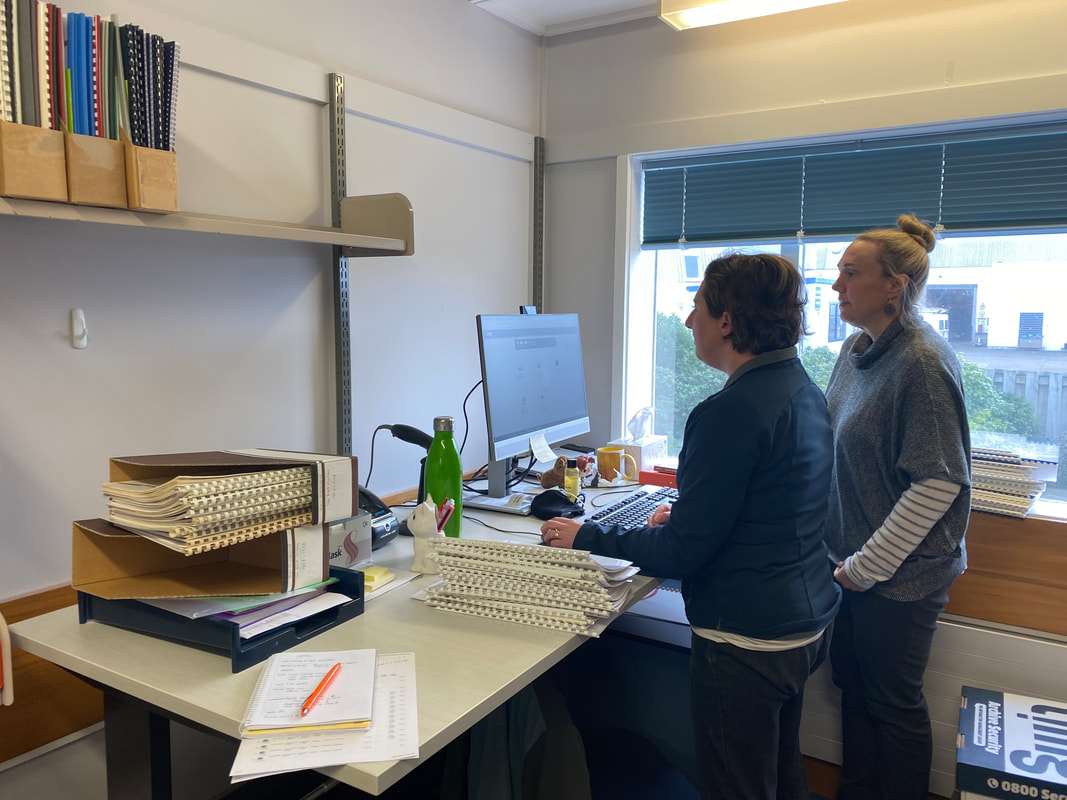HANNAH RUSSELL

Originally from Taihape, Hannah Russell has lived in a number of places in Aotearoa, and also in Singapore, the United Kingdom, and the United States. She has been Library Manager at National Institute of Water & Atmospheric Research (NIWA) since 2015, but Hannah began work at NIWA in 2006 as a reference and document supply librarian. She had multiple position titles over the years, in similar roles until her jump into library management. Before working at NIWA she worked in law and university libraries and had a part-time job in a school library while studying.
What does a typical day look like in your role?
We are a team of three full-time librarians at NIWA, with a casual part-timer currently employed to work on some digitisation. The library team is based at NIWA’s Wellington site but looks after around 700 NIWA staff in locations around the country, from Ruakaka in the north to Dunedin in the south. We have a fairly large collection, both in print and online, covering subjects including aquatic resources and environments, oceans, freshwater and marine fisheries, aquaculture, climate, atmosphere and weather hazards, and aquatic biodiversity and biosecurity.
For me, no two days are quite the same. I might have one or two meetings. I might do a little bit of book purchasing. I might download and examine some usage statistics. I might renew (or cancel) some individual journal subscriptions, journal package, or a database. I might run an EndNote or a library introduction session (mostly done via Teams these days). I might write a piece to promote library services and resources, or a report for senior management. I might attend a webinar. I might do some weeding from our physical collection.
What does a typical day look like in your role?
We are a team of three full-time librarians at NIWA, with a casual part-timer currently employed to work on some digitisation. The library team is based at NIWA’s Wellington site but looks after around 700 NIWA staff in locations around the country, from Ruakaka in the north to Dunedin in the south. We have a fairly large collection, both in print and online, covering subjects including aquatic resources and environments, oceans, freshwater and marine fisheries, aquaculture, climate, atmosphere and weather hazards, and aquatic biodiversity and biosecurity.
For me, no two days are quite the same. I might have one or two meetings. I might do a little bit of book purchasing. I might download and examine some usage statistics. I might renew (or cancel) some individual journal subscriptions, journal package, or a database. I might run an EndNote or a library introduction session (mostly done via Teams these days). I might write a piece to promote library services and resources, or a report for senior management. I might attend a webinar. I might do some weeding from our physical collection.
We all had an idea of what a librarian is or does when we were younger, what was yours?
My concept of a librarian when I was younger was a school librarian or a public librarian. It wasn’t until I started working towards a library qualification that special libraries entered my consciousness, and once I knew that such things existed, I was keen to work in one.
Did you ever think you would become a librarian?
I think it was always a vague possibility in the back of my head. I wanted to be a student librarian when I was in high school, but my friends talked me out of it. Peer pressure! I had a shortish first career in childcare, and it was when I started to get a bit bored with that, that I began to consider librarianship seriously.
Any career highlights you’d like to share with us?
One obvious career highlight was being appointed to my current role back in 2015. Even just a couple of years earlier it wouldn’t even have been something I imagined. But circumstances can change quickly sometimes! I’ve been to some good conferences over the years, both in Aotearoa and further afield, where I’ve been exposed to new ideas, and made lasting connections.
Career highlights would also have to include groups and committees I’ve been involved with. I was on LIANZA’s SLIS (Special Libraries & Information Services) committee for about ten years, with a few years as the co-convenor. This committee helped me stretch skills I hadn’t used in many years - public speaking for one. It gave me lasting associations and friendships with a lot of the people I served with. And I would say the same for IAMSLIC (International Association of Aquatic and Marine Science Libraries and Information Centers). I have been an IAMSLIC member for many years and served as the Pacific, and later Asia-Pacific, representative to the executive board from 2016-2021. Late last year I was elected as IAMSLIC’s junior president-elect and so will serve as president for the 2023-2024 financial year.
Being a member of IAMSLIC has given me links all around the world, and although I’ve only been to one in-person event so far, we have great conferences every year in fabulous locations – until the advent of the pandemic put everything to hold for a while of course. I also really enjoy working with the other library and information managers from the other six crown research institutes. We work fairly closely together, operating as a loose consortium, learning from each other’s work where we can.
My concept of a librarian when I was younger was a school librarian or a public librarian. It wasn’t until I started working towards a library qualification that special libraries entered my consciousness, and once I knew that such things existed, I was keen to work in one.
Did you ever think you would become a librarian?
I think it was always a vague possibility in the back of my head. I wanted to be a student librarian when I was in high school, but my friends talked me out of it. Peer pressure! I had a shortish first career in childcare, and it was when I started to get a bit bored with that, that I began to consider librarianship seriously.
Any career highlights you’d like to share with us?
One obvious career highlight was being appointed to my current role back in 2015. Even just a couple of years earlier it wouldn’t even have been something I imagined. But circumstances can change quickly sometimes! I’ve been to some good conferences over the years, both in Aotearoa and further afield, where I’ve been exposed to new ideas, and made lasting connections.
Career highlights would also have to include groups and committees I’ve been involved with. I was on LIANZA’s SLIS (Special Libraries & Information Services) committee for about ten years, with a few years as the co-convenor. This committee helped me stretch skills I hadn’t used in many years - public speaking for one. It gave me lasting associations and friendships with a lot of the people I served with. And I would say the same for IAMSLIC (International Association of Aquatic and Marine Science Libraries and Information Centers). I have been an IAMSLIC member for many years and served as the Pacific, and later Asia-Pacific, representative to the executive board from 2016-2021. Late last year I was elected as IAMSLIC’s junior president-elect and so will serve as president for the 2023-2024 financial year.
Being a member of IAMSLIC has given me links all around the world, and although I’ve only been to one in-person event so far, we have great conferences every year in fabulous locations – until the advent of the pandemic put everything to hold for a while of course. I also really enjoy working with the other library and information managers from the other six crown research institutes. We work fairly closely together, operating as a loose consortium, learning from each other’s work where we can.
 Stack 6 is our stack collection (about half of our journal collection) being packed up in May to go to off-site storage with TIMG.
Stack 6 is our stack collection (about half of our journal collection) being packed up in May to go to off-site storage with TIMG.
Do you have any advice for those who are currently finishing their LIS qualification?
Don’t pigeonhole yourself too early – look for work in different types of libraries, and in different types of roles. Sometimes it pays to get in touch directly with libraries that you’re interested to work in. You just never know. They might have a small project about to crop up that could be a step in the door and lead to other things. And don’t be afraid to put your hand up for committees and the like, where you can make valuable connections. They’re not just for people in senior roles - it’s good to get some new blood in every now and then.
Who or what would you say is one of the biggest influences on your career to date?
Probably the biggest influences on my career have been other people. I’ve had some great managers over the years. At the University of Auckland’s Philson Library, Linda Thomas and then Marianne Forbes were my first two direct managers as a new library assistant, and at NIWA my first managers were Kerrie Firth and Kath O’Shaughnessy, and then Charlotte Clements. I learned a lot about libraries and librarianship from them all, and from many others along the way too.
If you could recommend only one book (site or resource) to someone, what would it be?
I’m not even going to attempt to recommend one book – I would have to spend so long agonising over it! So instead, I’ll mention – while noting that a lot of people are feeling a certain amount of ‘Zoom fatigue’ at present – that I’ve really been appreciating all the good webinars that are springing up now. In particular, I think LIANZA and National Library have been doing a great job with these. LIANZA has a series going with Tom Smith from Blind Low Vision NZ at present, and I learned so much from the Creating Accessible Resources session. And a recent one from National Library that I got a lot out of was the launch of the Are we there yet? series, with Rachel Esson, Honiana Love and Courtney Johnston.
How would you like to see libraries and information services look in the future?
I would very happily settle for libraries and information services to be well-funded and well-staffed in the future. Plus supporting their community of users – whatever that community might be – to the very best of their abilities and being supported by their community in return.
Don’t pigeonhole yourself too early – look for work in different types of libraries, and in different types of roles. Sometimes it pays to get in touch directly with libraries that you’re interested to work in. You just never know. They might have a small project about to crop up that could be a step in the door and lead to other things. And don’t be afraid to put your hand up for committees and the like, where you can make valuable connections. They’re not just for people in senior roles - it’s good to get some new blood in every now and then.
Who or what would you say is one of the biggest influences on your career to date?
Probably the biggest influences on my career have been other people. I’ve had some great managers over the years. At the University of Auckland’s Philson Library, Linda Thomas and then Marianne Forbes were my first two direct managers as a new library assistant, and at NIWA my first managers were Kerrie Firth and Kath O’Shaughnessy, and then Charlotte Clements. I learned a lot about libraries and librarianship from them all, and from many others along the way too.
If you could recommend only one book (site or resource) to someone, what would it be?
I’m not even going to attempt to recommend one book – I would have to spend so long agonising over it! So instead, I’ll mention – while noting that a lot of people are feeling a certain amount of ‘Zoom fatigue’ at present – that I’ve really been appreciating all the good webinars that are springing up now. In particular, I think LIANZA and National Library have been doing a great job with these. LIANZA has a series going with Tom Smith from Blind Low Vision NZ at present, and I learned so much from the Creating Accessible Resources session. And a recent one from National Library that I got a lot out of was the launch of the Are we there yet? series, with Rachel Esson, Honiana Love and Courtney Johnston.
How would you like to see libraries and information services look in the future?
I would very happily settle for libraries and information services to be well-funded and well-staffed in the future. Plus supporting their community of users – whatever that community might be – to the very best of their abilities and being supported by their community in return.

